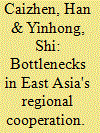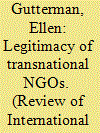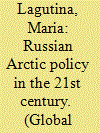|
|
|
Sort Order |
|
|
|
Items / Page
|
|
|
|
|
|
|
| Srl | Item |
| 1 |
ID:
132043


|
|
|
|
|
| Publication |
2014.
|
| Summary/Abstract |
The Problems Facing Regional Cooperation in East Asia great efforts are being made in East Asia to improve regional and Gsub-regional multilateral cooperation in the face of a bottleneck. The key issues are listed below:
First, there is a mismatch between size and effectiveness. Generally speaking, the larger the cooperation organization the more con?icts that arise and thus the less effective they are. Because of efforts by countries such as the U.S.,2 Australia, Japan, and India to further their strategic or diplomatic interests, these organizations are growing in regional coverage, which causes issues to become diversified and in turn causes the organizations to lose sight of their mission. Subsequently, many regional or trans-regional multilateral organizations such as APEC, the East Asia Summit (EAS), and the ASEAN Security Forum are increasingly playing aless effective role. For example, APEC summits and the EAS usually just
end up with a symbolic proclamation without any substance or ' Han Caizhen is Professor at the School of lntemational Studies, Renmin University of China. Shi Yinhong is Counselor at the Counselors' Office at the State Council and Professor at the School of lntemational Studies, Renmin University ot'China
|
|
|
|
|
|
|
|
|
|
|
|
|
|
|
|
| 2 |
ID:
131712


|
|
|
|
|
| Publication |
2014.
|
| Summary/Abstract |
This article develops theoretical insights concerning the legitimacy of non-profit Transnational Non-Governmental Organisations (TNGOs) in global governance. The research compares the advocacy initiatives of Transparency International (TI), the leading TNGO in the international regime of anti-corruption, in Germany and France during the 1990s. The main argument is that the legitimacy of TNGOs is a relational concept: it is granted or denied in a relationship between at least two parties, in which actor attributes play a role but are not decisive. Only such a relational conception can explain why a given TNGO is granted legitimacy in one context and denied it in another. In addition, legitimacy matters. Although insufficient on its own, legitimacy is a necessary condition for effective advocacy, which TNGOs can generate endogenously. To the extent that the legitimacy of TNGOs depends on their acceptance by dominant groups and powerful decision-makers, therefore, 'legitimate' TNGOs may function to sustain rather than challenge the structures of power which condition global outcomes in ways that are often contrary to the goals of equality, fairness, and justice. Thus to assess the impact of TNGOs in global governance, one must examine which TNGOs have been granted (or denied) legitimacy and influence, and why.
|
|
|
|
|
|
|
|
|
|
|
|
|
|
|
|
| 3 |
ID:
126376


|
|
|
|
|
|
|
|